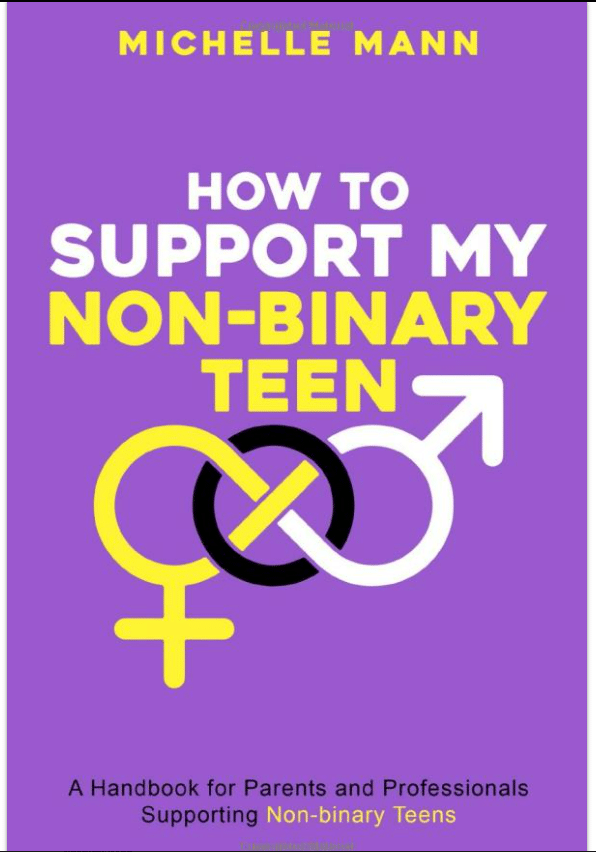
In this post, gender identity and sexuality can be a tough topic for many parents, but here is how one mom handled it when her daughter came out as a nonbinary teen.
Being a teen is tough, no matter what generation you’re from. But today’s teens have a whole new world that didn’t exist before the internet and social media.
We can’t compare the world where we grew up to theirs. With long wait times to see a therapist and hospital beds filled with teens and preteens with suffering from mental health issues and thoughts of suicide ideation, they’re struggling more than ever.
Related: Our Teen Girls Are Struggling: Here’s Why and What We Can Do About It
Why are more teens today exploring different sexual identities?
Teens today are exploring different identities, such as non-binary (someone who does not identify as exclusively a man or a woman), transgender (persons whose gender identity, gender expression or behavior does not conform to that typically associated with the sex to which they were assigned at birth), and gender fluid (a person whose gender identity (the gender they identify with most) is not fixed).
In today’s society, teens are experiencing things differently. Moreso than they once did, it may be because they are more aware of these differences.
Mir Kim, a contributor at Alpha Mom, writes this: “First, let’s be clear about two different concepts, here. Your gender refers to how you identify your own body/mind in terms of being male, female, agender (neither), or fluid (not adhering solely to one end of the spectrum or the other). This is not to be confused with your sexual preference, which may have nothing to do with gender at all, and refers to what you find attractive in a potential romantic partner. I know you asked about gender, but I’m mentioning sexual preference as well for two reasons: First, so that we can be absolutely clear that gender identification doesn’t necessarily relate to sexual preference (some people do find that confusing), and second, because—just as we’re seeing an increase in the number of teens claiming gender fluidity—we’re also seeing a lot more teens identifying themselves in broader terms than simply “heterosexual” or “homosexual.”
I know there are people who don’t believe someone can be a gender they were not born as and mock the “new” identities. It’s one reason those who are LGBTQ+ are more at risk for depression and anxiety. According to a study done by The Trevor Project, 45% of LGBTQ+ youth have seriously considered attempting suicide compared to 22% of all teens, and 3 in 5 have experienced anxiety.
My daughter was no exception.
Nothing prepares you for conversations about your teen’s sexuality and gender identity
One day, when my daughter was in middle school, she sat down next to me. Her leg was bouncing, and she twisted one of her rings.
“I want to tell you something, but I don’t know how you’ll react,” she said. These are the words every parent dreads.
My heart dropped to my stomach, and my brain went into overdrive, wild scenarios twisting in my mind.
She’d been struggling with mental health and self-harming. Did I miss the signs of something worse?
“Just tell me.” I braced myself for the bad news.
“I’m non-binary,” she blurted out, pinching her arm, leaving indents from her nails.
I had heard the term. Non-binary describes genders that do not fall into the two categories of male and female.
Society has been getting more vocal about different gender identities and sexual preferences. I didn’t understand how one could feel they were neither boy nor girl.
What I did know was that I loved my daughter, wanted her to be happy, and I didn’t need to understand to support her.
How I moved forward after my daughter sharing she was nonbinary
She wanted us to use the pronouns they/them and not she/her.
At first, this made my brain hurt as English teachers had drilled into me that they/them meant more than one person.
But if you think about it, society has been using they/them pronouns for decades when one didn’t know the gender of a person. When you vent about the idiot driver in front of you, ask about a teacher at school, or reference someone you’ve never met in person, you often use the words “they” or “them.” With this mentality, it was easier to embrace.
She also no longer wanted to be called by the name we so lovingly gave her when she was born. I admit this request hurt a little, but we were willing to put our feelings aside to support and provide a safe place for them.
We made a conscious effort to make these changes. Yes, we occasionally called them by their previous (birth) name. Sometimes we would slip and say she instead of they. At first, they would get upset and yell at us, finally stomping up to their room.
But after a while, they realized we were truly trying and simply would correct us.
We worked hard on it, and after a while, it was natural to call them how they preferred. Their younger siblings adjusted much quicker than my husband and I, but in our defense, we had been using that name for 12-plus years. Their older brother, who vocalized he thought the whole thing was stupid, even called them by their preferred name and pronouns.
My heart soared with the support their siblings gave them, but we still had a long road ahead of us.
A nonbinary teen needs a lot of support
They still struggled with mental health, including self-harm and overdosing on medication. There were counseling sessions and in-patient, and outpatient care. To figure out how we could help her, we did family meetings. We had long late-night talks.
We tried our best, sometimes saying or doing the wrong thing, and most times, it felt like we were always screwing up.
Many nights I cried, feeling like I failed as a parent for my child to be so sad and I was unable to help. It was the complete opposite of when they were little, and a hug would fix everything.
But we let them know, no matter what, that they were loved and we’d always be there for them.
It was a little over a year (and a period when they were gender fluid, where some days, they would identify as male, and others days, female) when they announced they wanted to go back to she/her. They took back their birth name, and identified as female.
We would have been fine if she had stayed non-binary. She still would be our child who we wanted to be happy and succeed at whatever she chose to do with her life.
I know that if we hadn’t supported her, and called her the pronouns and name she preferred, there is a very high chance she would not be with us today.
Yes, she still struggled, but we gave her the freedom to experiment and a safe place where she was loved.
For some teens, it will be a passing phase. For others, it truly is who they are.
This is what I learned as a parent of a nonbinary teen
No matter what, under no circumstances, treat your child’s gender or sexual identity like it is a phase.
They are in the middle of trying to find out who they are and where they fit into this world. If they do not feel the ones who are supposed to love them unconditionally support them, there could be dire consequences.
Teens who felt a high level of support from family have reported attempting suicide at less than half the rate of those who don’t. (The Trevor Project)
My biggest piece of advice: just be there.
Listen without trying to fix it. Simply sit by them, and let them know that no matter what, you got their back.
Many nights I sat by my daughter, neither of us saying a word. My presence was enough in that moment.
Teens will figure out things in time, but they need your unconditional love now more than ever.
A good practice is to do emotion checks. Have your teen rate how they’re feeling. Ask them what is one bad thing and one good thing that happened today. Don’t let them get away with saying nothing good happened. It could be something simple, like the sun was shining, or how they enjoyed feeling the breeze on their face.
If they vent to you about anything, ask them: do they want help fixing something, help problem-solving, or for you to just listen?
Keep the line of communication open. Don’t tell them others have it worse, and they have nothing to be depressed or anxious about. This can cause them to shut you out. They will suffer in silence, descending more and more into a dark abyss.
Be aware of depression and anxiety symptoms and self-harming.
It’s not a bad idea to have all medications, even acetaminophen, locked up. Do skin checks for signs of self-harm. It’s easy to take the blade out of a pencil sharpener and keep it hidden. These simple acts could save you a heartbreaking trip to the emergency room, or worse.
Make sure they have the crisis hotline number on their phone. Let them know they can use it anytime, day or night if they don’t feel like talking to you. You might have to call or text the line for them if they are having suicidal ideation.
There’s a chance they’ll be mad at you for making them talk, but I would rather have a mad teen than a dead one. And the first time is the hardest. It will open the door so they are more apt to call or text themselves in the future.
Moving your relationship forward
What matters is that we are there and support our kids in whatever way they need us. We are their shelter in a world that can be beyond cruel.
It’s not our job to push what we think our children should be, whether it’s about a career, love interests, or gender identity.
Our job is to help them discover who they are so they can be truly happy with themselves. Because if they aren’t happy with who they are, it will make everything else in life that much harder.
Being a parent is rarely an easy road, and sometimes you need to adjust your thinking to support your child in what they need. It’s not an effortless task, but your child will thank you someday.
In the US-Suicide and Crisis Lifeline call or text 988
Crisis Text Line–text BRAVE to 741741
National Suicide Prevention Lifeline–1-800-273-TALK
Looking for more support? We like this book, How To Support My Non-Binary Teen: A Guide for Parents and Caregivers by Michelle Mann.
Parenting teens and tweens is hard, but you don’t have to do it alone. These articles may help:
Dear Parents: This Is What to Do When Your Teen Comes Out to You
How my queer, Christian daughter inspired me to be a better human







Leave a Comment